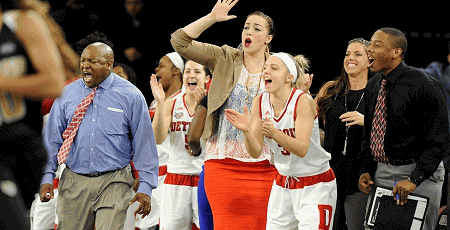Reaching The Mental Peak
by Anthony B. Lanzillo
From the Coach’s Clipboard Basketball Playbook"Helping coaches coach better..."
Tone Lanzillo is a mental prep coach to athletes who want to be mentally prepared to play their best game. He has worked with student-athletes, from middle school through high school and into college, in such sports as basketball, football, soccer and lacrosse. Over the past several years, he has written for a number of sports blogs and websites, including FirstDown Playbook, Coaches Training Room, Ultimate Hockey Source, and Lax Playbook.
Contact: Anthony B. Lanzillo
As a basketball coach, you want your players to be mentally prepared to play. To get this message across to your team, at one of your practices talk to them about what it takes to be an exceptional mountain climber. The climber needs to use various mental and physical skills to successfully reach the top of the mountain. This includes effectively coping with the different challenges and obstacles that he will face with each step up the mountain. And the farther up that mountain the climber gets, those challenges and obstacles will become bigger and more difficult.
Basketball players should look at their mental preparation like someone who is going to climb a mountain. It takes a variety of mental skills to not only start the climb but to successfully face and effectively cope with the physical and emotional challenges that the climber will face on his trek up the mountain. Likewise, being successful basketball players means that they must continue working on and developing those mental skills to elevate their performance and raise their game. If at any time they decide to stop improving or using those skills, there is probably a good chance that their game will drop or fall off. For the basketball player, that definitely means a poor performance. For a mountain climber, that could mean injury or death.
At every team practice, you can talk about the six steps your players need to take if they want to reach their mental peak. Not only do you want them to understand and appreciate how these steps will improve their overall game but you want the players to actually use what they are learning in practices in their games throughout the season. And, if the team is fortunate enough to play good enough to make it to a division, conference or regional playoff, you want the team to realize how essential these steps are if they want to be successful against tougher competition and make it to the top.
Step 1: Play With A Sense Of Purpose
The players need to know why they're doing what they're doing at every moment. Because if they don't know, then how do they know that what they're doing is the right thing to do? So, when they are at a team practice, each basketball player should know the purpose of any exercise, drill, workout in the weight room or scrimmage. Playing with a sense of purpose means that the player has goals, focuses on what he wants to achieve and knows what he is playing for.
Geno Auriemma
Step 2: Play With The Right Perspective
The players need to know how important their frame of reference is to how they play the game. If they play with the wrong perspective, like worrying about what they can't control or focusing on their weaknesses, then their mental game will break down. Therefore, at every practice, you want to continuously teach your players how to play with a positive, productive and proactive mindset. Playing with the right perspective means that the player focuses on his strengths, remembers what he is grateful for, and takes any negative experience and puts it into a positive frame of reference.Step 3: Play With A Presence Of Mind
The players need to know how vital it is that they keep their attention and focus in the present moment. When they become mentally sidetracked by thinking about what has happened or worrying about what could happen, they take their heads out of the game. Throughout each team practice, you want to continuously remind your players that by staying in the moment they will find that the pace of a game slows down, and that they will feel less anxiety and stress because they aren't thinking about things they can't control. Playing with a presence of mind means that the player knows how to keep his eyes and focus on now, and nothing else.Step 4: Play With Poise
The players need to know what can happen when they lose their composure when playing, and the impact that can have on themselves and their team during any game-time situation. Players need to identify the various triggers that can take away their mental game and know how they want to mentally respond to these triggers before they face them in a game. From learning to how tune out distractions, not overreacting to a ref's call or letting go of any verbal taunting from an opposing player or coach, your players need to know how to refrain from stepping on any of the mental landmines that could destroy their composure. Playing with poise means playing within yourself and simply taking care of yourself, and nothing else.Step 5: Play With Passion
The players need to know how to inspire and motivate themselves, and how to channel that energy into their mental game. Each player must take some time to find those things that he can use to fuel his desire and drive. For some players, it may be a piece of music. For other players, it's a certain word or phrase. And, for one player, it could be a person or cause that he is playing for. Playing with passion means bringing enthusiasm and enjoyment to all of the different experiences of being an athlete.
Step 6: Play With Perseverance
The players need to know how to effectively face various challenges and obstacles in sports and, at the same time, appropriately deal with any difficult feelings or emotions - including anxiety, fear, worry, anger or frustration. In the team practices, you want to talk to the players about the fact that they will face these emotions or feelings at various times in their sports career, if not in one season or even in a particular game. The key is to identify how they want to mentally engage those challenges and obstacles and rise above any negative feelings or emotions. Playing with perseverance means that the player knows how to maintain his focus on what he sees and what he wants, and not on what he feels and what he doesn't want.Copyright 2017, Anthony B. Lanzillo
Anthony B. Lanzillo serves as a mental skills coach to athletes and writes about the mental game for various sports websites.
Related pages: